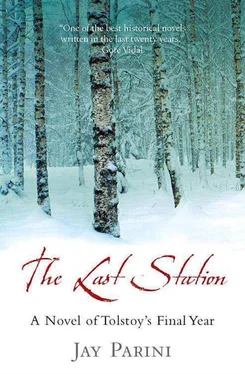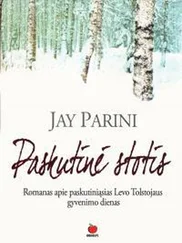I gave Papa the letters, and he took them reluctantly and went back to his room to read them.
Later that night, we sat about in Papa’s room, planning our next move. A fire in the stony hearth gave off the sweet odor of peat.
‘If we are to go,’ said Dushan Makovitsky, with his penchant for truisms, ‘we must know where we are going.’
‘Excellent, Dushan Petrovich,’ Varvara said, though I was the only one in the room who caught her sarcastic undertone. ‘Let us go somewhere.’
Papa seemed quite eager to discuss possible routes. It was suggested that Bulgaria or Turkey might be good destinations – nobody would know us there, and the climate would be tolerable. I wondered, however, if we might not need passports to cross the border. Why not settle in the Caucasus? There are several Tolstoyan colonies there, and they would be only too flattered if Leo Tolstoy himself chose to pass his final days among them.
We had been debating the pros and cons of the Caucasus for a while when, unexpectedly, Papa began to speak in an angry voice. It was quite unlike him. ‘No! I cannot stand these projections, these ridiculous plans. Let us go… anywhere will do. We need no plans.’
Papa has always avoided plans, preferring the spontaneity of a butterfly. He likes to point out that Christ himself was against plotting the future.
‘I am very tired,’ Papa said.
‘Let me take you to your bed, Papa.’
I led him to a cot in the small room with whitewashed walls and a vaulted ceiling. The bed table had been laid out just like at home, with a candle, some matches, a notebook, and sharpened pencils. He likes to be able to make notes in the middle of the night if he should awaken with an idea or want to record a dream.
He lay down gingerly. He was so exhausted he did not even want me to remove his boots, though I covered him with a rough wool blanket, since the room was very cold. He was asleep before I left, snoring through his wrinkled mouth. It worried me that his breathing was so uneven.
I slept in a room with several other women and Varvara Mikhailovna. It was a peculiar, disorienting experience. The room smelled of beeswax and disinfectant. A filthy cat slept under my cot, making my eyes itch. An old woman coughed in her sleep like a goat on the hillside. I was freezing.
Somehow, I managed to fall asleep. But Varvara Mikhailovna woke me at four, pricking the bubble of my dreaming with her sharp words.
‘Wake up, Sasha! We’re leaving. Your father wants to go while it’s dark. He thinks Sofya Andreyevna is closing in.’
I hated the cynical note she had been adopting. ‘It’s not possible,’ I said.
‘You frightened him last night. He thinks your mother is planning to follow you. He won’t be convinced otherwise.’
‘This is insane. Papa can’t stand this kind of shifting about.’
I saw Dushan Makovitsky in his nightdress, standing in the doorway with a candle. He had come to wake us and was waving frantically. His feet were bony and bare.
The road to the station at Kozelsk was full of ruts and runnels. Parts of it had been washed away by a recent storm, and there was a lengthy detour through a farmer’s turnip patch. Though the station was only nine miles away, it took hours to get there. The droshky we had borrowed from the nuns seemed barely to hang together. Papa groaned as the wheels rattled over each bump, and I knew now that he was dying. The glaze of his eyes frightened me. He seemed already to have abandoned the life of this world, though he had not yet entered the next one. I wanted to weep but restrained myself.
We took the first southbound train from Kozelsk, aiming vaguely for my cousin’s estate near Novocherkassk. Denisenko is fond of Papa, and they have recently been in correspondence. Papa seemed to approve of this plan, even though it would take at least twenty-four hours to get there.
‘Leo Nikolayevich is well enough for such a journey?’ Varvara asked Dushan.
‘He’s in reasonably good shape,’ he said.
Dushan Makovitsky is an optimist, as I am. We wanted very much to push straight through to Novocherkassk, if possible. But Papa looked ghastly when we got to the station, his eyes clouding over, his hands trembling.
‘Are you sure you’re able to travel, Papa?’
He looked at me askance, hurting my feelings.
‘Do you feel well enough, Leo Nikolayevich?’ Dushan asked him, taking his pulse. ‘There is no point in damaging your health.’
‘We have to go, Dushan. I have no choice.’
‘Pulse – seventy-six. Excellent,’ announced Dushan, as if my father’s health were his invention.
‘I think we should stay here,’ said Varvara. ‘Sofya Andreyevna will not follow. Tanya is with her.’
But the decision had already been made, and Papa was not going to change his mind.
‘Please get me the newspapers,’ he said. Whenever he begins a journey by train, he buys all the papers.
Dushan Makovitsky bought the papers, but I could see by his dour expression that something was amiss.
‘Read the headlines,’ he said, pointing to the front page of one paper. It read: TOLSTOY ABANDONS HOME! WHEREABOUTS UNKNOWN! Another paper said: SAGE OF YASNAYA POLYANA TAKES FLIGHT!
Papa leafed through them and shook his head. ‘They know everything,’ he said. ‘It’s no use.’
Everyone in the railway car was yammering about the headlines, embarrassing Papa. A dapper fellow behind us in an English waistcoat said, ‘He’s given her the slip. Good for him!’ His friend, a slightly older man, gave a wink and said, ‘She wasn’t giving him what he wanted, eh?’ They both giggled like schoolboys. Papa’s face took on the impassive but depthless quality of stamped tin. He clenched his fists.
‘It’s Leo Tolstoy! That’s him!’ a man shouted.
Dushan Makovitsky ran to quiet him, but it was too late. Everyone in the carriage instantly realized that Tolstoy was there. They had all seen his picture in the newspapers, and he does not resemble many people, with his white beard and wild, snowy eyebrows. I looked back at the men who’d been gossiping about him so gaily and enjoyed their panic. The older man, in particular, looked as though he’d been caught naked in the Winter Palace by the tsar himself.
‘Be sure your sins shall find you out,’ Dushan whispered in a voice just audible to the men.
I saw Varvara Mikhailovna wince, and I pinched her. Dushan saw the pinch and blushed. He muttered something, but I ignored it. I love to embarrass him.
As word spread through the train that Tolstoy was aboard, crowds gathered in the passageways at either end of the carriage. Curiosity seekers kept passing us in the aisles, gawking at the most famous Russian in the world. I was oddly proud of being the daughter of Leo Tolstoy just then, but I felt protective, too. I hated their insolence, their scummy faces, the incessant leering and pothering. Who did they think they were?
I asked the conductor to control the crowd, and he agreed to help, bowing and saying, ‘Yes, Your Excellency. Anything you wish, Your Excellency.’ This particular address seemed out of place in a rather scrubby, second-class carriage; anyway, I object to such forms of subservient behavior, although the man’s solicitude was useful for the moment.
I heated some barley soup for Papa over an oil stove at the back of the carriage, with Dushan, who had become rather talkative. He likes it that Papa is a famous man.
‘You should have seen the fuss on the way to Optina,’ he said. ‘Everyone gathered around him in the railway car, asking questions about God, about the proper form of government, about taxes. You should have seen your father! He stood in the center of the carriage and lectured for an hour about Henry George and his theory of the single tax. A man who had just left his home of eighty-two years! And he’d had no sleep the night before, either. Not a wink. He’s remarkable. A remarkable man.’
Читать дальше












